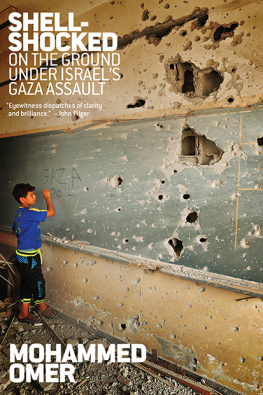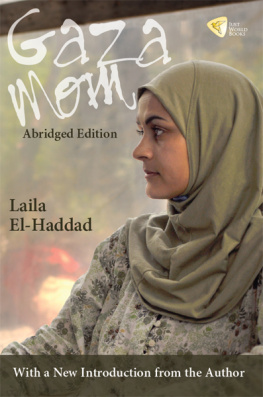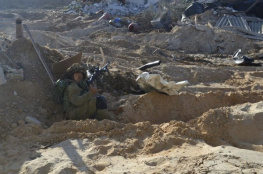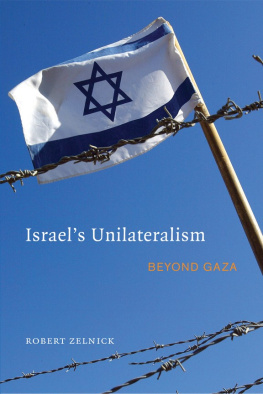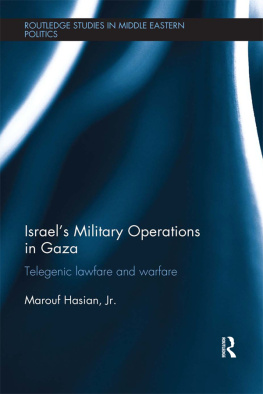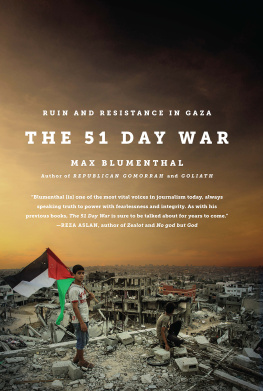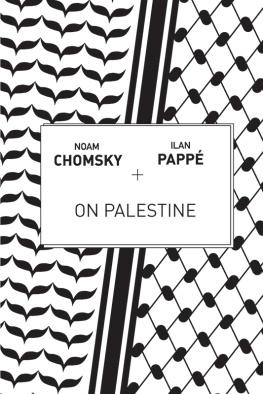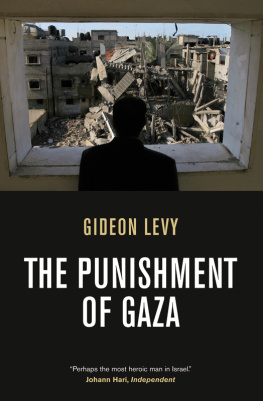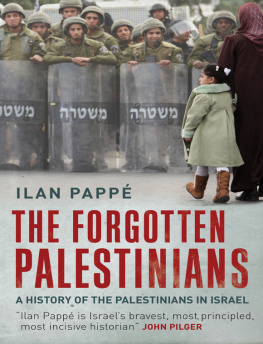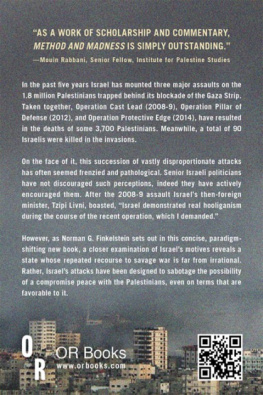
Operation Protective Edge, launched in early July 2014, was the third major Israeli assault on the Gaza Strip in six years. It was also the most deadly. By the conclusion of hostilities some seven weeks later, 2,200 of Gazas inhabitants had been killed, and more than 10,000 injured.
In these pages, journalist Mohammed Omer, a resident of Gaza who lived through the terror of those days with his wife and three-month-old son, provides a first-hand account of life on the ground during Israels assault. The images he records in this extraordinary chronicle are a literary equivalent of Goyas Disasters of War: childrens corpses stuffed into vegetable refrigerators; a family rushing out of their home after a phone call from the Israeli military informs them that the building will be obliterated by a missile in three minutes; donkeys machine-gunned under instructions to Israeli soldiers to shoot anything that moves; graveyards targeted with shells so that mourners can no longer tell where their relatives are buried; fishing boats ablaze in the harbor.
Throughout this carnage, Omer maintains the cool detachment of the professional journalist, determined to create a precise record of what is occurring in front of him. But between his lines the outrage boils, and we are left to wonder how a society such as Israel, widely-praised in the West as democratic and civilized, can visit such monstrosities on a trapped and helpless population.
PRAISE FOR SHELL-SHOCKED
Mohammed Omer could easily have escaped the horror of Israels impending assault on the trapped and helpless people of Gaza. Instead, he chose to stay, to record, in searing and vivid detail, the savagery of Israels latest escapade of mowing the lawn and the steadfastness of the victims of a hideous tragedy. Few can match his courage and integrity, but all of us who live in countries providing the arms and diplomatic support that made Israels actions possible should ponder his words and ask ourselves what has been done in our name and what we should do about it.
NOAM CHOMSKY
Read Shell-Shocked. Its author says, Im a journalist and I owe it to my people and the Israeli people to get to the truth. Thank you, Mohammed, the truth is like water, a basic necessity without it we will not survive.
ROGER WATERS
Written with painful immediacy, these are more than dispatches from a war zone: they convey the human reality of people who manage to survive and endure in conditions that have grown grimmer and more inhumane over the years.
RASHID KHALIDI
With a terrible and necessary exactitude, Mohammed Omers war chronicle lets the world know the devastating losses borne by the Gazan people bombarded by Israeli forces in 2014.
JUDITH BUTLER
The truth about Israels crimes in Gaza can never be forgotten, never successfully lied about and covered-up, because Mohammed Omer was there. This great reporter and his family were under fire day after day. When I phoned him, I could hear the explosions outside his front door. Yet, day after day he produced eyewitness dispatches of such clarity and brilliance that, almost single-handed, he reclaimed the honour of real journalism.
JOHN PILGER
From the very heart of Gaza, a witness to war: history will record Mohammed Omers searing testimony about what was done to his homeland by Israels Operation Protective Edge This is journalism of the highest order.
JON SNOW, CHANNEL 4 NEWS
If you only have time to read one book on Israels 2014 war on Gaza, let it be this one. Mohammed Omers on-the-ground reporting is stunning and unforgettable, giving access to a daily reality few can imagine let alone endure. Omer describes the landscape of Palestinian life and death in this tiny strip of land during this horrific period. Yet, his accounts are not only about the immense suffering of Gazas people but about their remarkable resilience and dignity, which cannot be destroyed. An act of conscience and documentation, Omers book will remain with the reader long after it is read.
SARA ROY
ALSO BY MOHAMMED OMER
Oslo Accords 19932013: A Critical Assessment
(co-edited with Petter Bauck)

2015 Mohammed Omer
Published by OR Books, New York and London
Visit our website at www.orbooks.com
All rights reserved. No part of this book may be reproduced or transmitted in any form or by any means, electronic or mechanical, including photocopy, recording, or any information storage retrieval system, without permission in writing from the publisher, except brief passages for review purposes.
First printing 2015
Cataloging-in-Publication data is available from the Library of Congress.
A catalog record for this book is available from the British Library.
ISBN 978-1-939293-92-3 paperback
ISBN 978-1-939293-93-0 e-book
Cover photograph by Anas Baba.
Typesetting and e-book conversion by AarkMany Media, Chennai, India.
Introduction
Now, a year since the last war on Gaza, I find myself reflecting on my first meeting with Jalal Jundia. It was during the summer of 2014 when I saw him sitting atop the ruins of his family home, surrounded by dust and rubble. Though he was attempting to remain calm I could see that his face was etched with lines of stress. Like so many in Gaza, he had lost everything during the Israeli assault, the most recent of a series of attacks that arrive with predictable frequency every three to four years. Jalal wondered aloud about his wife and six children. Where could they go now their home had been destroyed? Where was it safe? They were trapped in Gaza and unable to leave. All they could do was wait for the bombings to end and pray for a day when drones no longer occupied the sky. Perhaps then there would be enough peace for his family to rebuild and attempt a return to some sort of normal life.
A year later, Jalal is still homeless. His house has not been rebuilt and his family survives, but is barely alive. As for myself, I try to remain optimistic, no small feat in this ruined shell of what was once a beautiful and self-sufficient costal enclave. Our reality is predicated upon Israels determination to drive us from our homes for good. After the 194748 purge, an ethnic cleansing of non-Jewish residents from territories Israel coveted but had not been granted by the United Nations, Gaza became a safe haven for tens of thousands fleeing the massacres at the hands of the Irgun, Stern and Lehi gangs. Self-admitted terrorist organizations, these were the forerunners of todays Israeli military, police and Shin Bet. Meanwhile our elders today, the men, women and children who fled before the Zionist militias, still hold on to the keys of the homes they lost. These keys represent hope and a determination. One day they hope to return home.
In the wake of this latest attack, the vast majority of Gazas children remain traumatized. We continue to live under siege, limited in what we can buy, export or import. We cant leave and it is very difficult for people to visit us. We listen resignedly as human rights activists laud the fact that we Palestinians can withstand the aggression simply because we have survived it for so long. That may be true but it begs the question: why should we be forced to continue to put up with this misery? The Second World War lasted six years; the Third Reichs assault and ethnic cleansing of those it deemed undesirable lasted twelve. Our oppression has lasted sixty-seven years, making the Israeli occupation of Palestine one of the longest in history.

